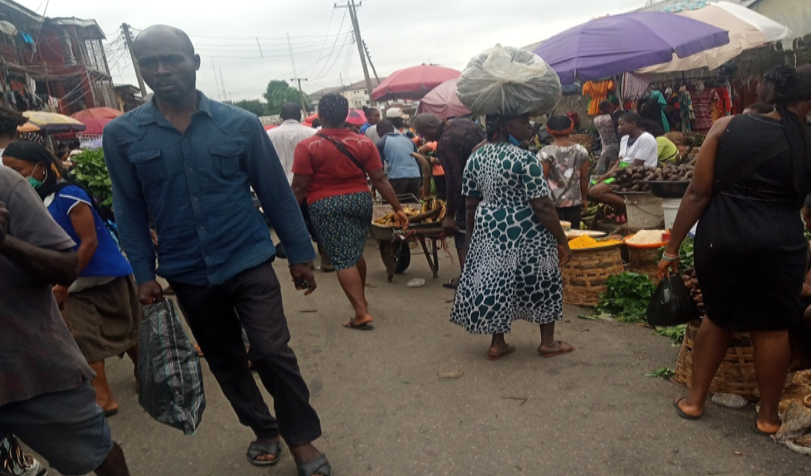
RIVERS STATE REPORT
“We, the food suppliers, are essential service providers, because food is an essential commodity for human survival. But, the security agents at roadblocks and checkpoints along the highways, insist on collecting money from us, before allowing us to proceed into Rivers State. There are so many roadblocks now because of COVID-19 and the ban on inter-State movements. At each point, these security agents collect between 3,000 Naira and 5,000 Naira.”
Those were the words of Mukhtar, a middle-aged truck driver who lamented to Social Action personnel in Port Harcourt, about the nefarious activities of some unscrupulous Security Officers along the highways, whom motorists encounter on a daily basis. Findings have revealed that their activities have led to an exponential increase in the cost of food in Rivers State. Following the outbreak of COVID-19 in Nigeria and in a bid to hinder the spread of the pandemic, the Federal Government placed a ban on inter-State travels, whilst State Governments across the country, tried to prevent movements to and fro their respective States. This led to a massive deployment of security personnel from various Security outfits (Nigerian Army, Police and Civil Defence Corps) to the highways and State borders, to enforce the ban on inter-State movements and prevent the movement of non-essential service providers. These Security officers who mounted barricades at different checkpoints, have reportedly taken advantage of the pandemic to perpetrate the act of illegally extorting money from everyone, who intends to travel for essential or non-essential purposes.
Majority of the residents in the State have become poorer within the last three months, owing to various reasons related to the pandemic, such as loss of regular income, loss of jobs, inability of their employers to pay full salaries, etc. These people presently find it very challenging to meet the high cost of food, daily. Social Action personnel, who have been monitoring the impacts of COVID-19, spoke to some members of communities within Port Harcourt, to feel the pulse of the people at the grassroots whose small- and medium-scale enterprises contribute largely to the GDP of the State. These local entrepreneurs, many of whom are traders of foodstuffs, have attributed the unprecedented inflation in the selling price of food, to the increase in the cost price. According to them, the people who convey the food from different parts of the country, into Rivers State, encounter security agents at various checkpoints who extort money from them. Food suppliers are made to part with thousands of Naira at the different checkpoints, until they get to their destination where they sell the food products to retail-traders, after inflating the wholesale price to recover the money extorted by security agents along the way. These retail-traders go ahead to sell the products at an increased cost to the consumers who are made to bear the brunt of the illegal extortions and the economic hardship resulting there from, while the governments at all levels, do nothing to end the injustice.
The illegal extortion of money from food transporters and the unfair transfer of the burden of that illegality to the end-users of the food products, has caused the exorbitant prices of food products currently being witnessed in Rivers State. A rubber (popularly known as ‘Custard rubber’) of tomatoes which was worth ₦800 before the outbreak of the pandemic in February, this year, now costs ₦2,500, while a big basket of tomatoes which was ₦14,000, is now ₦27,000. Also, a rubber of Garri which hitherto sold at ₦400, now costs ₦850. A rubber of Beans sells for ₦1,200, as opposed to the initial cost of ₦800 as of February, 2020. The fresh Tilapia fish which was worth ₦300, now costs ₦600 for the same category of fish. To further aggravate the plight of the people, the cost of baking flour and eggs increased, which led to a spike in the cost of the most commonly-eaten food – bread. A small size of bread which was sold at ₦200, presently costs ₦400, which puts it beyond the reach of many low-income families who need as many as five or more of that size of bread, to feed an entire household.
Social Action is of the informed view that, notwithstanding the unavoidable effects of COVID-19 on the global economy, there are some effects that are ‘artificially’ created by some greedy stakeholders, whose intention is to take advantage of the COVID-19 pandemic for selfish reasons. There is no justification for the extortion of money from food transporters, by security agents along the highways and at the State – borders. The essence of preventing the passage of non-essential service providers, is defeated when both the essential food providers, as well as non-essential service providers are being granted a right of way, only after they have been made to part with some money, howbeit illegally.
Social Action therefore calls on the Rivers State Government and the Local Governments within the State, as well as the Federal Government of Nigeria, to immediately bring an end to the economic injustice perpetrated against the masses, in their respective places of control. Food suppliers are essential service/commodity providers who ordinarily should be given a Permit by the government which guarantees their right of passage into any State in the country where their food supplies are needed. Food suppliers, confirmed to be genuinely supplying food only, should not be harassed by security agents, because food products are essential. Both essential and non-essential service/commodity providers should not be ‘robbed’ by security agents at checkpoints, or anywhere else. If the government is unwilling or unable to stop the illegal extortion of money by security agents, then the ban on inter-State travel, which has clearly not been enforced by the security agents, should be lifted with immediate effect, in order to restore the free passage of travellers across the country and reduce food prices.
